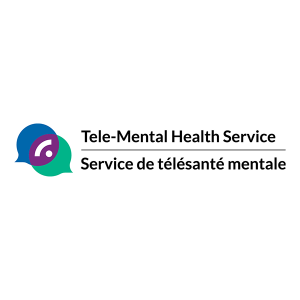Tele-Mental Health Service

 Who we are
Who we are
The Tele-Mental Health Service (TMHS) utilizes virtual platforms to connect children/youth, families, and their mental health workers to our team of mental health specialists.
TMHS is a provincial program funded by the Ministry of Health, collaboratively provided by SickKids, Children’s Hospital of Eastern Ontario and Vanier Children’s Mental Wellness.

TMHS Specialists have a range of expertise on topics that include, but are not limited to:
- Attention deficit hyperactivity disorder
- Disruptive behaviour disorders
- Mood and anxiety disorders
- Learning difficulties
- Attachment disorders
- Psychosis/thought disorders
- Transgender care
 What we do: programs and services
What we do: programs and services
Direct clinical consultation
A direct, one-time clinical consultation with a mental health specialist (psychiatrist, social worker, nurse practitioner, psychologist). The consultation is conducted with the child/youth, their family and their case manager. A clinical consultation can provide:
- Diagnostic clarification
- Treatment recommendations
- Medication review and recommendations
- Help prioritizing treatment in complex cases
- Assist in managing safety and risk
A report will be sent to the referring provider 10 business days following the appointment. A follow-up appointment may be requested by the referring provider or mental health specialist.
We do not provide ongoing mental health care, counselling or medication prescriptions.
Professional-to-professional consultation
A consultation between a mental health provider and a specialist (without the child/youth and their family present). This is an opportunity for a provider or interdisciplinary team (e.g., school, primary care, etc.) to talk with the consulting specialist and may be useful when:
- Child/Family does not consent to a direct clinical consultation
- Child/Family does not show up for their appointment
- A follow-up to a direct clinical consultation where a mental health provider may have questions about treatment recommendations
Program consultations
A capacity building service for community agencies to access expert mental health specialists to consult on clinically relevant cases and topics. Our TMHS specialist meets monthly with a designated group of mental health providers to discuss clinical, program-wide and community issues. Topics discussed may include:
- Individual youth and their emotions/behaviours
- Diagnosis
- Case formulation and management
To submit a program consultation request, please contact your designated Coordinating Agency.
Education sessions
- Requested education sessions can cover a wide range of clinical topics and can be delivered as a one-time session or presented as a short education series. Education sessions are tailored to the needs of the requesting agency and can be of an introductory or advanced level to meet the needs of the diversity of practitioners.
To submit an education session request, please contact your designated Coordinating Agency.
- Provincial education sessions are scheduled, provincial-wide webinars available to child and youth mental health providers throughout the academic year (new topic ~ every two weeks). For more information on our provincial sessions, please email telepsychiatry@sickkids.ca.
 Benefits of TMHS
Benefits of TMHS
- All clinical services are offered virtually using secure platforms (OTN, Zoom Healthcare), removing the need for travel
- Shorter wait list for specialist services compared to those in many local communities
- Bilingual services available in English and French, interpretation can be arranged for other languages at no cost
- No OHIP coverage needed
 Eligibility
Eligibility
- Age 0-18 (up to 18th birthday)
- Presents with mental health concerns
- Case manager must be present during the consultation
Exclusion criteria
- Custody/access assessments
- Parenting capacity assessments
- Youth justice assessments for court purposes
- Immediate risk assessment (contact local Emergency department)
 Referrals
Referrals
Who can refer
All referrals and/or service requests must be submitted through a designated coordinating agency. All publicly funded child and youth mental health (CYMH) service providers working with children/youth and students in rural, remote and/or underserved communities within Ontario can refer to the Tele-Mental Health Service through their designated coordinating agency. This includes:
- Publicly funded CYMH agencies
- School boards
- Youth Hubs
- Hospital out-patient programs
- Family health teams
- Aboriginal Health Access Centers
- Friendship Centers
- Youth justice (excluding court-ordered assessments)
- Mental health professionals in other community-based agencies that provide child and youth mental health services
How to refer
We partner with seven coordinating agencies across the province designated to coordinate TMHS for an identified service area within Ontario. They work directly with communities and agency staff to make referrals to the TMHS program, and coordinate appointment bookings. Referrals should be directed to the coordinating agency dedicated to your service area.
To make a clinical consultation referral or professional-to-professional referral:
- Identify your local coordinating agency using the postal code tool below
- Complete both the referral form and consent form (available below)
- Submit the completed forms to your local coordinating agency
To submit a program consultation or education session request:
- Identify your local coordinating agency using the postal code tool below
- Contact the agency to submit a request form
* If you work within a Youth Justice setting, please email the Clinical Interventions Unit directly to complete a program consult or education request form: CIU@ontario.ca.
Find the agency in your area
The tool below helps you quickly find the Tele-Mental Health Service agency serving your local area. Enter the first 3 digits of your postal code to locate your local agency.
TMHS Referral Forms (English)
- TeleMental Health Referral Form (PDF)
- TeleMental Health Follow Up/Second Opinion Request Form (PDF)
- TeleMental Health Consent to Disclosure Form (PDF)
TMHS Referral Forms (French)
Please note that written recommendations will be provided in English.
Appointments for the Tele Mental Health Service typically last between 1 to 2 hours.
- Consent form with child/youth signature
- Referral package that includes details about current concerns, previous work done with the youth, and complete service provider information (service provider’s fax number must be included)
- Previous assessments (psychiatric, education, speech/language, drug/alcohol, psychological, etc.)
- IEP/School Interviews/Report Cards
- Youth justice court documents
- Relevant medical information, etc.
In order to ensure an effective consultation, it is recommended that the number of people who can participate in the consultation be limited to (if consented): 1 case manager, 1 additional professional, the child/youth and parent(s) or caregiver.
This is a one-time consult. Follow ups can be requested using the follow-up referral form.
The specialist may want to speak with everyone present in the meeting. They may ask questions about family history, birth history, medical history. They will ask many questions to get to know the client/family and their situation.
For more information and frequently asked questions:

Contact us
General inquiries:
- Phone: 1-877-507-7301
- Fax: 416-813-2189
- telepsychiatry.inquiries@sickkids.ca
Intake inquiries:
- Phone: 416-813-6503
- telepsychiatry@sickkids.ca
Our history
Tele-Mental Health began in 2000 as a pioneering videoconference-based program. Over the years, it has grown in reach, technology, services, funding, and even its name.
At first, the program only provided one-time consultations with child psychiatrists and specialist children’s mental health professionals to select children’s mental health agencies chosen by the Ministry of Child & Youth Services.
In 2007, Tele-Mental Health expanded significantly with the introduction of Eastern and Western delivery hubs, extending services to more children’s mental health agencies.
By 2011, the program had grown further, making its services available to all children’s mental health providers in non-urban areas of Ontario. This expansion was followed by a pilot program in the Greater Toronto Area, bringing Tele-Mental Health to urban communities.
Today, Tele-Mental Health is a province-wide program that supports a wide range of mental health providers in delivering mental health care to children and youth.
Our future
- Click to view our 2029 strategic plan (PDF)
- Cliquez pour consulter notre plan stratégique 2029 (PDF)
Our vision: Empowering Communities, Building Capacity: Collaborating for Equity and Diversity in Child and Youth Mental Health Across Ontario
Our mission: The Tele-Mental Health Service focuses on collaboration and capacity building to support child and youth mental health across Ontario, with attention to Indigenous, Francophone and underserved communities. Through community partnerships, we bring comprehensive mental health expertise, aiming to enhance local capacity to support children/youth and families. We remain committed to genuine partnership and reciprocal learning, equitable and culturally safe access, and breaking through barriers to mental health services.

